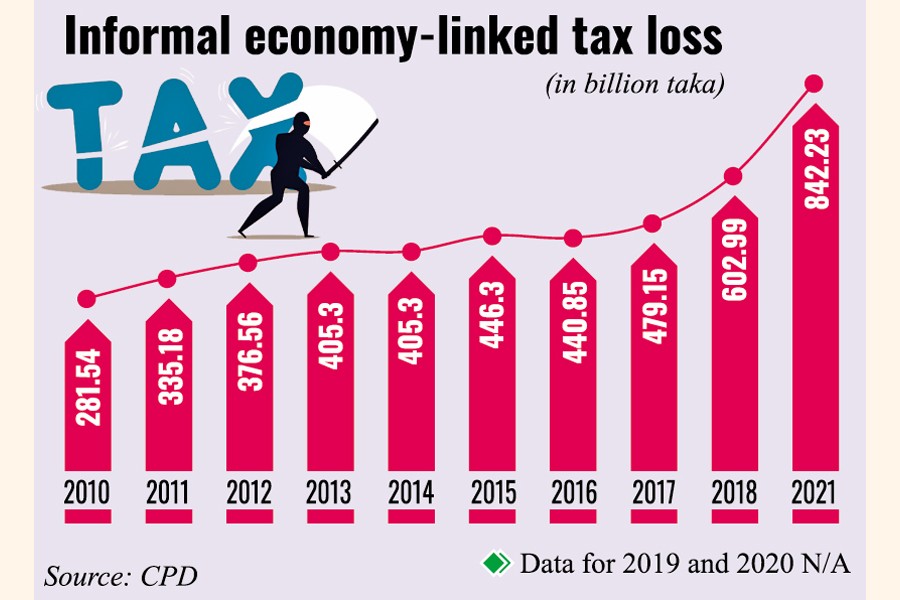Black_cats
ELITE MEMBER

- Joined
- Dec 31, 2010
- Messages
- 10,031
- Reaction score
- -5
High corporate tax rates help generate black money
FE REPORTPublished :
Apr 03, 2023 10:38 PM
Updated :
Apr 03, 2023 10:40 PM
Bangladesh loses potential revenue worth Tk 558 billion to Tk 2.92 trillion annually for widespread tax avoidance and evasion, according to a survey, while the country struggles to manage large budget deficits.
The country's current fiscal budget has a Tk 2.45-trillion deficit -- little less than the highest sum of tax loss through the two ploys.
As disclosed Monday, the Centre for Policy Dialogue (CPD) study findings show high corporate tax rate as one major cause of tax avoidance that creates a big hole for 'black money' accumulation.
And economists and analysts say high concentration of undeclared money is a major reason for capital flight or siphoning off huge funds.
The amount of 'tax evasion' is estimated to be eight times of social safety net and welfare expenditures while amount of 'tax avoidance' is 200 per cent of health expenditure set in the national budget.
The CPD revealed the findings of a study styled 'Corporate tax transparency issues and concerns in Bangladesh: Its implications on tax losses and social spending", at a media briefing in Dhaka. The CPD has carried out the study in association with Christianaid, a UK charity fighting global poverty.
Dr Fahmida Khatun, Executive Director of the CPD, delivered welcome speech while Dr Khondoker Golam Moazzem, its research director, presented the study findings. Programme Manager, economic justice, of Christianaid Nuzhat Jabin also spoke.
As per survey respondents' estimate, tax losses in Bangladesh might range between 5.0 and 25 per cent for avoidance and 15 to 80 per cent for evasion.
"In 2021, Bangladesh's tax loss was Tk 842 billion due to the shadow economy. The amount is equivalent to one-third of the total tax revenue collected that year," said Dr Moazzem.
Tax loss stemming from informal economy was close to 300 per cent while from tax evasion estimated to be around eight times the social-safety and welfare expenditure, he said.
Citing example of Brazil and China, Dr Moazzem said cross-country data do not reflect that large volume of informal economy is reason for lower tax collection and tax-GDP ratio as other factors are crucial determinants. In Bangladesh, the volume of tax loss to shadow economy jumped to Tk 842 billion in 2021 from Tk 222 billion in 2010.
Difference between tax-GDP ratio and corporate-tax rate is the highest in Bangladesh as compared to South Asian peers, he said.
The CPD study shows around 68 per cent of Bangladeshis pay no income tax. Corporate income-tax-compliance rate is also poor, as only one in five registered companies pay tax.
Eight types of industrial companies, including jute, textile, knitwear, poultry, and private educational institutions, are enjoying tax waiver ranging between 3.0 and 15 per cent.
Per-capita expenditure on health and education in the national budget could be increased to Tk 6844 and Tk 9638 from Tk 1862 and Tk 4656 respectively if the government could check the leaks.
The country would be able to increase collective budgeted expenditure (Tk 1395 billion) on health, education and technology and social safety and welfare by over 100 per cent, says the CPD in its study report.
"It is quite evident that high corporate-tax rate is not the significant factor to pull tax-GDP ratio," he told the function, adding that higher tax rate triggered the accumulation of black money due to its disincentives against tax compliance.
The think-tank suggests that the government take measures to check tax avoidance and evasion by corporate entities by using various tactics.
It listed the ploys that include reserve and provision, showing less income, unethical support from tax practitioners, showing more investment allowances, high informal or cash-based transactions and individual intention to show less income.
The remedies for corporate-tax evasion it shows are integrated financial system, mandatory sustainability reporting, training tax officials, and improving country's secrecy index.
"Tax exemptions and related incentives should be for a limited time, and must be purposive," Dr Moazzem said, ahead of the next budget that is now being cobbled up.
For the upcoming budget for fiscal year 2023-24, the CPD proposed that the government set an annual target of reducing the tax avoidance through gradual phase-out of incentives, tax breaks and other concessions for established sectors, withdraw tax exemptions for various sectors, set annual target of collection of revenue by recovering money from tax evasion, set strategies for formalization of all types of economic transactions through digitisation of transaction system and so.
The policy advocacy strongly recommends withdrawal of all kinds of non-transparent tax- related provisions, including black money-whitening scheme, which contradicts tax-transparency efforts.
The government should concentrate on reforming the tax structure in a bid to achieve the targeted goal of 17-percent tax-GDP ratio by 2030 and International Monetary Fund (IMF) target of 9.5 per cent by FY 26.
To conduct the study, the survey team selected 60 publicly-listed companies in readymade garment, pharmaceutical, cement, and banking sectors but did not find any visible sample of tax evasion or avoidance.
Ten professional chartered accountants and two former officials of the National Board of Revenue (NBR) were key informant interviewees in the study.
Dr Fahmida made a point that the government carries out reform when development partners put pressure on it, but it should be done spontaneously.
Ms Jabin of Christianaid said income-inequality target, set in the Sustainable Development Goals (SDGs), could be met if the government could take steps to reduce tax loss.
doulotakter11@gmail.com

High corporate tax rates help generate black money
Bangladesh loses potential revenue worth Tk 558 billion to Tk 2.92 trillion annually for widespread tax avoidance and evasion, according to a survey, while the country struggles to manage large budget deficits. The country's current fiscal budget has a Tk 2.45-trillion deficit -- little less than
